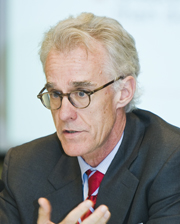Press Release
|
U.S. scholar Stephan Haggard paints a negative picture of South Korea's past and present policies on North Korea, saying he believes a mixture of engagement and constraining policies is the better way forward. Speaking last week at a forum hosted by the Seoul-based East Asia Institute, Haggard noted that the engagement-oriented Sunshine Policy implemented by the past two South Korean governments was "a gamble that had risks." He also discussed flaws of Vision 3000, President Lee Myung-bak’s reciprocity policy on the North that aims to help Pyongyang reach $3,000 in per capita annual income in 10 years on the condition of denuclearization and an open economy. Haggard, director of the Korea-Pacific Program at the University of California, San Diego, has written extensively about human rights, famine and economic development in North Korea. |
Stephan Haggard |
He said the "heavily non-commercial" nature of inter-Korean trade adversely affected the South's engagement policy. "The idea of engagement is you engage commercially and therefore transform North Korea," Haggard told the audience of academics and journalists.
"But most of North-South trade is not commercial," he added, referring to South Korea's aid to the North, its business operations in Kaesong, and its now-suspended tourism to the Mount Kumgang resort. All these, Haggard said, had largely political overtures.
While Haggard said he doesn’t view the engagement policy as a failure, he did point to its fundamental problems.
"North Koreans do not want South Korean businessmen running around North Korea," Haggard said. "As a result, it's not South Korea's fault that this didn't work. It's that North Koreans are going to be extremely cautious about commercial engagement with the South.
"The reason Kaesong is an enclave, and Kumgang is an enclave and the reason everything is negotiated, safe to say, at the highest level, is precisely because the [North Korean] regime is very intent on making sure the type of engagement which [former President Kim Dae-jung] wanted doesn't take place," Haggard added.
But Haggard guarded against assuming any policy would succeed on North Korea and said it'd be "a false inference" to think that simply because something didn't work, its opposite would. He was referring to the Vision 3000 policy that links any economic aid to the North to denuclearization.
Criticizing the policy, Haggard said, "I don't think there was much consideration on what would happen if the North Koreans did what they did," including the nuclear test, missile launches and Pyongyang’s declaration that it would continue to develop nuclear weapons and would never return to the six-party talks.
"The North is not interested in the particular package of economic inducements that have been core features of engagement strategy or the Vision 3000 strategy," Haggard added. "When we talk about inducements, you have to depart from the realm of political economy and talk about what's really of value to the North Koreans, which is recognition [of their regime]."
Haggard noted the patience in Washington for North Korea "is very low" and he’s been surprised by the shift in mood away from accommodation. He also cautioned that "the fact that North Koreans are annoying is not the basis for sound policy."
He also said the Obama administration represents "a return in some way to [the] Bush [administration]" in assuming the tough policy on the North, but he also understands that Obama had to take such a stance "for alliance and proliferation reasons."
"The U.S. is seriously concerned about the proliferation issue," Haggard said. "North Korea is looking for money. And the way it earns money in part is by exporting arms, providing technical assistance on missiles [or] building reactors in deserts. And the U.S. is very concerned about that."
Haggard pointed to the difficult food situation in the North, calling the country "a chronic humanitarian emergency" that is "incapable of feeding itself." And under such destitute circumstances, there is "even more incentive" for the North to engage in the aforementioned activities.
"I think one of the reasons the Obama administration has been attracted to this hard-line policy is because of this resurgence, or fear of resurgence, of illicit activities and increase of exports of weapons to places like Burma, Iran and Syria, and quite possibly to Hezbollah and Hamas," Haggard said. "The U.S. is looking at this through the lens of the effect of the North Korean proliferation on the balance of power in the Middle East."
Haggard said North Korea is becoming more open, but only to states that aren't going to place demands on it, such as China and Middle Eastern countries. He opined that the solution would be to try to have the best of two contrasting policies. "North Koreans aren't going to magically stop what they're doing," Haggard argued. "It's never about engagement versus constraints. It’s always going to be a mix of those two policies."
